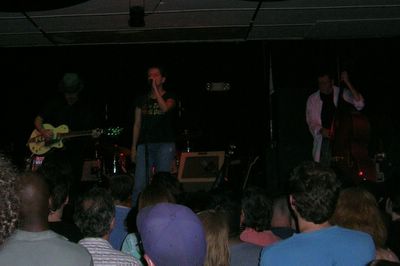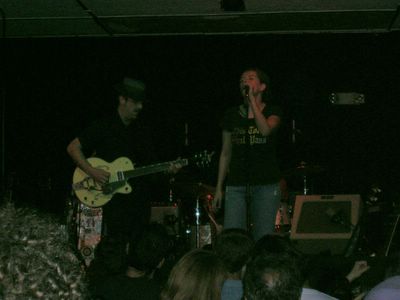Since we're almost halfway through the year, it feels like the right time to post what I consider the top films to date. Except for a few stragglers, my mid-year list doesn't seem to mirror my top ten come year's end--most of them drift to the realm of the honorable mentions--although some of these are going to be tough to move down. The usual caveat applies to this in-progress list: films may switch spots for seemingly no reason between now and the end of the year.
1.
KINGS AND QUEEN (Arnaud Desplechin, 2004)
A film so maddeningly brilliant that it practically defies description or analysis. Some think it's the art film equivalent of the emperor's new clothes. Perhaps they're right. When I saw it I had such a hard time putting my thoughts into words that I just didn't bother. More than any other new film, I felt my brain's synapses firing like crazy during Desplechin's delirious magnum opus. The Wexner Center is supposedly bringing this back in a few months, so maybe then I can put my enthusiasm into more specific terms.
2.
NOBODY KNOWS (DARE MO SHIRANAI) (Hirokazu Kore-eda, 2004)
One of my favorite filmmakers tells a harrowing tale of abandoned children with such delicacy and grace that the dark places it goes don't feel oppressive.
NOBODY KNOWS seems to owe much to Truffaut, specifically
THE 400 BLOWS and
SMALL CHANGE. It's sort of like if the first Antoine Doinel film focused exclusively on the time he ran away from home and found a hidden place in Paris to live and play. The children in
NOBODY KNOWS are mostly confined to their parent-free home but don't see the gravity of the situation, turning it into their own little paradise. (A tracking shot of the eldest running through the city and the film-ending freeze frame are the strongest tip-offs to any intended
400 BLOWS homage.) Hirokazu dwells on the resiliency of the children, a theme that also resonated in
SMALL CHANGE.
3.
WAR OF THE WORLDS (Steven Spielberg, 2005)
Spielberg's visually magnificent and utterly terrifying film proves that there's no one better at making event movies. Although it isn't particularly deep in regard to character or theme,
WAR OF THE WORLDS rattled and awed me. The unrelenting intensity becomes uncomfortable while the visualization of terror from above and below is technically impressive and believable.
4.
CRASH (Paul Haggis, 2004)
Haggis' eloquent examination of race relations posits more questions than answers, but it offers redemption to those struggling with these issues in contemporary America. Superbly acted and fluidly directed to connect multiple storylines,
CRASH brings stereotypes and prejudices to the forefront in hopes of breaking them.
5.
FEVER PITCH (Bobby Farrelly and Peter Farrelly, 2005)
Simply put, it's
ANNIE HALL for baseball fans and one of the best romantic comedies of the last ten years.
6.
MURDERBALL (Henry Alex Rubin and Dana Adam Shapiro, 2005)
This brash, highly entertaining documentary breaks all kinds of preconceptions and misconceptions about quadriplegics. Shot almost exclusively from the vantage point of a wheelchair,
MURDERBALL introduces the rough and tumble world of quad rugby and the hardnosed men who play the game. It's uplifting and inspirational without being cloying or sentimental.
7.
THE EDUKATORS (DIE FETTEN JAHRE SIND VORBEI) (Hans Weingartner, 2004)
Weingartner taps into youthful feelings of anti-capitalist rebellion a la
FIGHT CLUB, without the violent outbursts, and idealistic self-doubt, the kind that plagued Mark Wahlberg’s character in
I ♥ HUCKABEES .
THE EDUKATORS consist of two young men who break into the vacant homes of the wealthy, rearrange their possessions, and leave notes proclaiming sentiments such as, “Your days of plenty are numbered.” Their motivation is to make the victims uneasy about their accumulated wealth, not to steal or destroy. Scenes of the political pranksters at work are playful and tense. While
THE EDUKATORS has affection for the young radicals played by Daniel Brühl, Julia Jentsch, and Stipe Erceg , the final destination isn’t apparent from the outset because their principles get put to the test when a mission takes an unexpected turn.
THE EDUKATORS' complex political message is also sprinkled with humor and a romance that interjects some
JULES ET JIM tension.
8.
DOWNFALL (DER UNTERGANG) (Oliver Hirschbiegel, 2004)
Hirschbiegel dramatizes much of the same material found in the too-dry doc
BLIND SPOT: HITLER'S SECRETARY for this riveting inside story of national political madness. Bruno Ganz's performance as Hitler is nothing short of chilling because he plays him not as a monster but as a human, albeit a profoundly disturbed one who perpetuated some of the past century's greatest evil.
9.
ME AND YOU AND EVERYONE WE KNOW (Miranda July, 2005)
If Todd Solondz were a humanist, he might make something like performance artist Miranda July's hilarious debut feature film. Dressed in cheerful pastels,
ME AND YOU AND EVERYONE WE KNOW is a comic look at how people keep themselves apart, stay confused about sex and love, and desperately want human contact but are afraid or think themselves unworthy of it. July expertly straddles the line of edgy humor without taking it someplace really twisted.
10.
MILLIONS (Danny Boyle, 2004)
Two motherless boys find a gym bag full of money in
MILLIONS, a children’s film that gets the directorial energy that Danny Boyle brought to
TRAINSPOTTING. Damian (Alexander Nathan Etel), a mystical lad who converses with the saints, believes it is a gift from God and is determined to distribute the cash to the needy, much to the chagrin of his older brother Anthony. Frank Cottrell Boyce’s screenplay crafts a wonderful allegory for the value of money. (With the impending conversion to Euros, the English pound will be worthless.) Boyle demonstrates that a family film with a moral message mustn’t be a musty affair.
MILLIONS asks hard questions about faith and charity in entertaining and visually inventive ways.
10a.
HEAD-ON (GEGEN DIE WAND) (Fatih Akin, 2004)
Here's proof positive that I should take notes more often. I liked this quite a bit but can't remember enough to write about it. Everyone else has called it a punk rock love story, and well, that's going to have to suffice for now.
10b.
BATMAN BEGINS (Christopher Nolan, 2005)
A post-9/11
BATMAN film that succeeds as much in exploring trenchant ideas of fear, both personal and civic, as in fulfilling the comic book poses.




